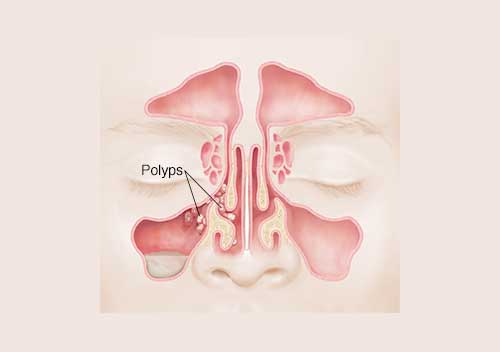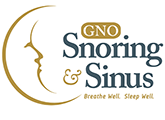Nasal Polyp Treatment

What Are the Types of Nasal Polyps?
Nasal polyps are benign growths that appear on the lining of your sinuses or nasal passages. These growths are produced by chronic inflammation that can often cause blockage in your nasal passages, leading to breathing issues. According to the Mayo Clinic, approximately 20% of patients who suffer from chronic sinusitis will also develop nasal polyps. While nasal polyps can affect almost anyone, they are mostly found in adults.
There are two different types of nasal polyps:
Ethmoidal polyps
Antrochoanal polyps
Nasal Polyps Symptoms
While it’s possible to have chronic sinusitis without developing nasal polyps, the two are often associated. Because nasal polyps are soft and hard to feel, if they’re small, you may not even know you have any. Larger nasal polyps may block your sinuses and nasal passages, leading to uncomfortable symptoms. The most common symptoms of nasal polyps include:
- A runny nose and\or persistent stuffiness
- Postnasal drip
- A decreased or absent sense of smell or taste
- Facial pain or headache
- Upper teeth pain
- Snoring
- Frequent nosebleeds
Nasal Polyps Treatments
Many patients who suffer from nasal polyps also suffer from significant allergies. This is why GNO Snoring & Sinus offers complete nasal testing as part of our checkup for nasal polyps. When treating nasal polyps, the goal is to reduce their size or eliminate them. Even after surgery, nasal polyps can still return. Patients who are suffering from nasal polyps may be a candidate for one of these treatment options that can be done at the GNO Snoring & Sinus office:
Dupixent injection
Inhibits interleukin-4 (IL-4) and interleukin-13 (IL-13), two main contributors to the inflammatory response that causes the development of nasal polyps. Not only effective in reducing nasal polyps, the Dupixent® injection also lessens the need for multiple steroids and surgeries.
Steroid implants
Treats inflammation in the nasal polyps while mitigating the risks commonly associated with systemic steroid utilization. This steroid implant, eluding over time, aims to reduce scarring and polyps in the sinuses.
Sinus surgery (FESS)
Removes polyps and any other anatomic obstructions that impair adequate sinus drainage. This procedure aims to restore proper sinus ventilation and improve the natural clearance of sinus secretions.
Hybrid balloon sinuplasty
Utilizes a combination of balloon sinuplasty and sinus surgery (FESS) techniques to treat all four sinuses on each side of the face. This procedure targets the ethmoid sinus with sinus surgery and uses balloon sinuplasty on the maxillary, frontal, and sphenoid sinuses.
Image-guided sinus surgery
Employs image-guided procedures for patients with extensive polyp disease, as well as those who have previously undergone multiple sinus surgeries. Our in-office surgical technology is programmed to interact with your CT Scan of the Sinus, which allows for a safe and effective treatment.
Allergy Testing
Administered either as a skin test or a blood test and can be used to indicate your degree of allergy. The results of this maintenance treatment option aims to determine your eligibility for regular allergy shots that can help reduce the reoccurrence of your polyps.
New Patient Visits for Nasal Polyps
Initial Visit
During your initial visit at GNO Snoring & Sinus, Dr. Anand will review your symptoms and medical history to make an accurate diagnosis.
Workup
Treatment
Nasal Polyps FAQs
What are the most common symptoms associated with nasal polyps?
I have had numerous surgeries and medications for my polyps, but they keep recurring. What are my options?
How does Dupixent® injection therapy work?
Will my polyps turn into cancer?
How extensive is surgery for nasal polyps?
Symptom Quiz
Click all symptoms you experience and complete the short form below to learn more about the possible treatment options for your condition.
Contact the Team at GNO Snoring & Sinus
Dr. Anand is the leading authority in treating sleep and sinus disorders in Metro New Orleans. GNO Snoring & Sinus proudly accepts Medicaid, Medicare, and other private insurance options for all of our services. Save time and find your relief fast at GNO Snoring & Sinus, where we can do in one appointment what would take three appointments as a general ENT. Request an appointment today for help finding relief for your nasal polyps.
